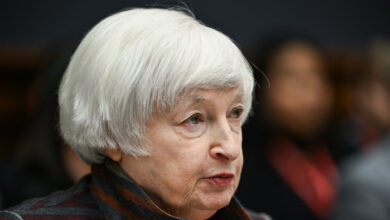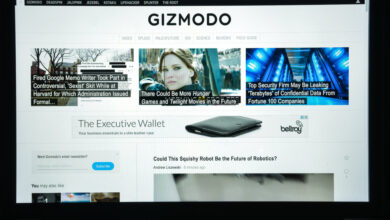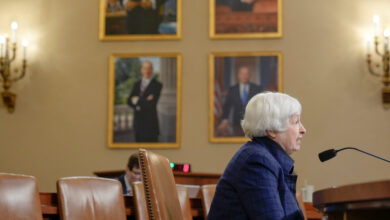Boeing Faces Turbulence Ahead of a Decisive Senate Hearing

Stormy weather
Boeing’s boss, Dave Calhoun, will testify before a Senate panel on Tuesday, as yet another whistle-blower has come forward, alleging the planemaker was negligent in tracking hundreds of faulty parts.
Calhoun will step down by December, but that hasn’t stopped lawmakers, investors and customers from hammering the company.
Now, Boeing is reportedly struggling to find a successor, highlighting the scale of the challenge to fix an iconic American company.
Calhoun will say that the culture is still “far from perfect.” He will be grilled on a range of issues hanging over the company, from multiple whistle-blower accusations to the events leading up to the midair blowout of a door plug on an Alaska Airlines 737 Max 9 jet in January.
Calhoun will again acknowledge that more work is needed on quality and safety, according to Reuters.
That’s unlikely to satisfy lawmakers. The company’s “broken safety culture” should have been addressed a long time ago, Richard Blumenthal, the Democratic chair of the Permanent Subcommittee on Investigations of the Senate’s Homeland Security Committee, told Reuters. He pointed out that Boeing crashes in 2018 and 2019 killed almost 350 people.
Boeing’s search for a new C.E.O. shows the depth of its problems. Calhoun has kept a low profile since announcing in March that he would leave. But The Wall Street Journal reports that several candidates have turned down Boeing’s overtures. They include industry veterans: Larry Culp, head of GE Aerospace, and David Gitlin, a Boeing director and C.E.O. of Carrier Global.
Other potential candidates bring their own problems. Stephanie Pope, Boeing’s C.O.O., was a rising star, but the company is under pressure to pick an outsider.
Talks with Pat Shanahan, a former Boeing executive, are on hold because he now leads Spirit Aerosystems — the company that made the faulty part on the ill-fated Alaska Airlines plane, and which Boeing wants to reacquire, The Journal reports.
Boeing’s other troubles are mounting. The Justice Department is weighing whether to prosecute the company for violating a settlement related to the 2018 and 2019 crashes. The head of the Federal Aviation Agency has said his own agency didn’t regulate Boeing strongly enough, promising tougher reviews of the company. Customers are turning to Airbus, Boeing’s European archrival. And Boeing may need to finally find a new model to replace its 737 workhorse.
Boeing may be a victim of becoming a national champion. Lina Khan, the chair of the F.T.C., has argued that today’s problems go back to 1997, when Boeing was allowed to buy McDonnell Douglas and became the only American commercial aerospace giant.
“Relying on a national champion creates supply-chain weakness and taxpayer liabilities, but it also creates geopolitical vulnerabilities that can be exploited both by global partners and rivals,” she said in a speech in March.
Here’s how, she said:
-
Boeing lost its innovative edge and quality fell amid reduced competition;
-
Management started to view the work force as a cost;
-
Boeing became too big to fail, making it vulnerable to foreign governments seeking to influence U.S. policymaking.
All of that underscores that whatever happens at Tuesday’s Senate hearing, Boeing still faces plenty of turbulence.
HERE’S WHAT’S HAPPENING
Amazon Labor Union members vote to join forces with the Teamsters. Members of the union representing warehouse workers for the e-commerce giant said Tuesday that they had voted overwhelmingly to affiliate with the International Brotherhood of Teamsters, one of the country’s largest labor organizations. Both groups said the alliance would increase their negotiating leverage over wages and working conditions.
The Justice Department sues Adobe over software subscriptions. Prosecutors accused the technology company of making it hard to cancel subscriptions to Photoshop and other products and charging “hidden” fees for doing so. It’s another facet of the Biden administration’s effort to check the power of Big Tech; the F.T.C. filed a similar lawsuit against Amazon last year.
The electric vehicle maker Fisker files for bankruptcy protection. The company is winding down its operations just a year after releasing its first model; it follows other E.V. companies including Arrival and Lordstown Motors in declaring insolvency. In related news, Warren Buffett’s Berkshire Hathaway has trimmed its stake in BYD, the Chinese E.V. giant.
Apple will shut its ‘buy now, pay later’ offering. The iPhone maker said it’s scrapping Apple Pay Later, which allowed the customer to split purchases into four no-interest payments, just over a year after its introduction. Meanwhile, Margrethe Vestager, the European Union’s competition chief, on Tuesday told CNBC that she found “very serious” issues with Apple “being noncompliant” with the bloc’s digital marketplace rules, raising the specter of charges.
A record-setting rally that not everyone is feeling
Another day, another record.
Investors are continuing to pile into equities — especially tech stocks — driving global markets up on Tuesday. That comes after a trio of Wall Street analysts raised their year-end forecasts for the S&P 500. But not everyone is feeling jubilant about the rally.
The S&P 500 has hit a record in five of the past six sessions, and 30 times this year. Citigroup and Goldman Sachs see the benchmark index finishing the year at 5,600, representing a gain of about 17 percent. Evercore ISI forecasts it hitting 6,000.
Those upgrades come with strings, however. A procession of central bankers, including Patrick Harker, the president of the Philadelphia Fed, have warned that Fed policymakers are in no hurry to join their global peers in cutting interest rates.
Inflation in the U.S. remains above the central bank’s 2 percent target, and companies are reporting that their lower-income consumers are pulling back. (The next data point to watch is Tuesday’s retail sales report.)
Voters seem to be paying little attention to the market gains. It’s similar to how polls show President Biden getting little credit for an economy that’s outgrowing its biggest trading partners.
Inflation is a big source of voter discontent, and the $1.9 trillion stimulus package that Biden pushed for in 2021, when households were hit by the pandemic, is getting some blame for pressuring up consumer prices.
But economists credit the law with accelerating the country’s recovery.
The stock rally is rife with contrasts, too. Consider:
-
The S&P 500 is up nearly 15 percent this year, but a handful of tech stocks are driving the lion’s share of that gain.
-
The so-called Magnificent 7, companies including Alphabet, Amazon, Apple, Microsoft and Nvidia that are closely tied to the boom in artificial intelligence, are up 36.5 percent this year.
-
The Russell 2000, a broader collection of stocks that better represents the full breadth of the U.S. economy, is down slightly this year.
Lisa Shalett, the chief investment officer at Morgan Stanley Wealth Management, raised the alarm Monday in a client note: “Equities have returned to a pattern of concentration, with extreme overconfidence in the few and skepticism about the many,” she wrote.
“We will finance this program by dipping into the pockets of those who can most afford it.”
— Olivier Faure, the head of France’s Socialist Party, on his economic platform being paid for by tax increases on the wealthy. Fears of those plans are prompting French business leaders to court Marine Le Pen, the standard-bearer of the country’s far right, ahead of legislative elections next month, according to The Financial Times.
The crypto industry flexes its political muscle
As the Biden administration cracks down on the crypto industry, many of the sector’s supporters are fighting back. And among their most potent weapons is political spending on the 2024 elections, The Times’s David Yaffe-Bellany, Erin Griffith and Theodore Schleifer report.
“The 2024 elections will be the most consequential in crypto’s history,” Brad Garlinghouse, the C.E.O. of the payment company Ripple and a frequent critic of crypto regulations, told The Times. “You are seeing a technology become a partisan political issue.”
Crypto giants have donated millions to PACs in this election cycle, with Ripple, the venture firm Andreessen Horowitz and the exchange Coinbase each having donated about $50 million. That money has gotten results: Fairshake, the industry’s largest PAC, spent about $10 million on ads attacking Representative Katie Porter, a crypto critic who was seeking the Democratic nomination for California’s Senate seat. Porter, who lost the race, later decried attacks on her by “a few billionaires.”
Fairshake is now turning its attention to four other Senate races this year, including close contests in Ohio and Montana, where Democrats who have been critical of crypto are up for re-election.
Trump appears to have the edge. While the former president once said that Bitcoin “seems like a scam,” he has changed his tune in recent weeks in an effort to court the industry.
Last week, Trump met at Mar-a-Lago with executives from some of the world’s largest Bitcoin mining companies. And earlier this month, he attended a fund-raiser at the San Francisco home of the venture capitalist David Sacks and reiterated his support for crypto, The Times reported.
Mark Cuban and others want Biden to mend fences with the crypto industry. The president’s re-election campaign has been receptive to the message, Cuban told The Times. In recent weeks, Biden officials have reached out to Coinbase and Ripple, asking to discuss crypto policy, according to The Times.
Could crypto sway the election? Industry executives often cite a survey commissioned by Coinbase that suggests 52 million Americans own digital currencies. Yet the Fed estimates that the total is 7 percent of U.S. adults, or roughly 18 million people.
Crypto’s bigger impact might come from its wallet, however: “A single relatively small industry is literally trying to buy enough politicians to hijack the public agenda,” Dennis Kelleher, the president of Better Markets, an advocacy group often critical of the finance industry, told The Times.
THE SPEED READ
Deals
Elections, politics and policy
-
Federal prosecutors have arrested George Norcross, the insurance executive who became a kingmaker in New Jersey politics, charging him with racketeering. (NYT)
-
“What Happened to Glenn Youngkin?” (Politico)
Best of the rest
-
Shares in GameStop tumbled about 12 percent Monday after the company offered no details on its strategy at its long-awaited annual meeting. (CNBC)
-
Warner Bros. Discovery hired Robert Gibbs, the former spokesman for President Barack Obama and McDonald’s, as its communications chief. (Hollywood Reporter)
-
William Donaldson, the Wall Street financier who co-founded the investment bank Donaldson, Lufkin Jenrette and later led the S.E.C., died on Wednesday. He was 93. (NYT)
We’d like your feedback! Please email thoughts and suggestions to dealbook@nytimes.com.



